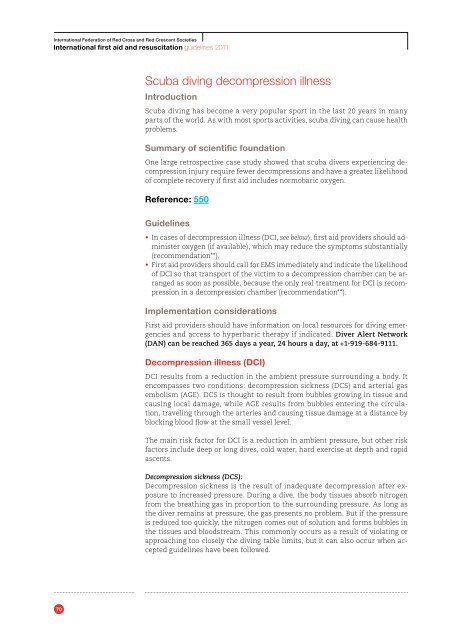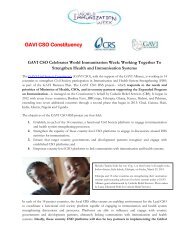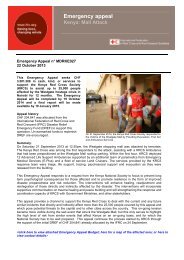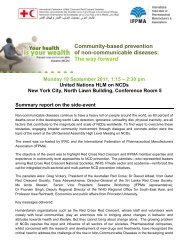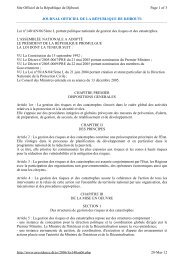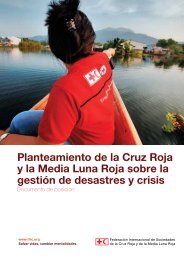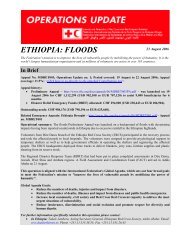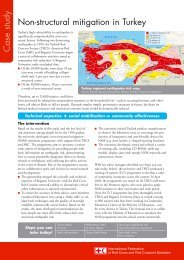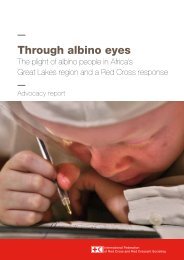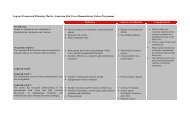IFRC International First Aid and Resuscitation Guidelines 2011
IFRC International First Aid and Resuscitation Guidelines 2011
IFRC International First Aid and Resuscitation Guidelines 2011
You also want an ePaper? Increase the reach of your titles
YUMPU automatically turns print PDFs into web optimized ePapers that Google loves.
<strong>International</strong> Federation of Red Cross <strong>and</strong> Red Crescent Societies<br />
<strong>International</strong> first aid <strong>and</strong> resuscitation guidelines <strong>2011</strong><br />
Scuba diving decompression illness<br />
Introduction<br />
Scuba diving has become a very popular sport in the last 20 years in many<br />
parts of the world. As with most sports activities, scuba diving can cause health<br />
problems.<br />
Summary of scientific foundation<br />
One large retrospective case study showed that scuba divers experiencing decompression<br />
injury require fewer decompressions <strong>and</strong> have a greater likelihood<br />
of complete recovery if first aid includes normobaric oxygen.<br />
Reference: 550<br />
<strong>Guidelines</strong><br />
• In cases of decompression illness (DCI, see below), first aid providers should administer<br />
oxygen (if available), which may reduce the symptoms substantially<br />
(recommendation**).<br />
• <strong>First</strong> aid providers should call for EMS immediately <strong>and</strong> indicate the likelihood<br />
of DCI so that transport of the victim to a decompression chamber can be arranged<br />
as soon as possible, because the only real treatment for DCI is recompression<br />
in a decompression chamber (recommendation**).<br />
Implementation considerations<br />
<strong>First</strong> aid providers should have information on local resources for diving emergencies<br />
<strong>and</strong> access to hyperbaric therapy if indicated. Diver Alert Network<br />
(DAN) can be reached 365 days a year, 24 hours a day, at +1-919-684-9111.<br />
Decompression illness (DCI)<br />
DCI results from a reduction in the ambient pressure surrounding a body. It<br />
encompasses two conditions: decompression sickness (DCS) <strong>and</strong> arterial gas<br />
embolism (AGE). DCS is thought to result from bubbles growing in tissue <strong>and</strong><br />
causing local damage, while AGE results from bubbles entering the circulation,<br />
traveling through the arteries <strong>and</strong> causing tissue damage at a distance by<br />
blocking blood flow at the small vessel level.<br />
The main risk factor for DCI is a reduction in ambient pressure, but other risk<br />
factors include deep or long dives, cold water, hard exercise at depth <strong>and</strong> rapid<br />
ascents.<br />
Decompression sickness (DCS):<br />
Decompression sickness is the result of inadequate decompression after exposure<br />
to increased pressure. During a dive, the body tissues absorb nitrogen<br />
from the breathing gas in proportion to the surrounding pressure. As long as<br />
the diver remains at pressure, the gas presents no problem. But if the pressure<br />
is reduced too quickly, the nitrogen comes out of solution <strong>and</strong> forms bubbles in<br />
the tissues <strong>and</strong> bloodstream. This commonly occurs as a result of violating or<br />
approaching too closely the diving table limits, but it can also occur when accepted<br />
guidelines have been followed.<br />
70


